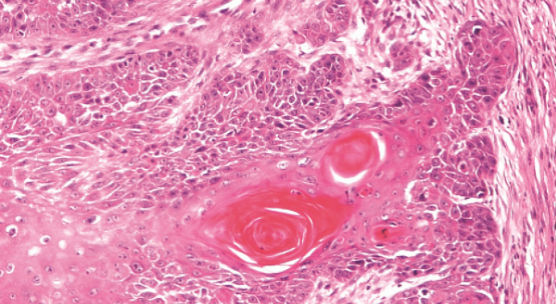Skin cancer model boost for prevention and treatment
Published On Tue 17 Jan 2017 by Roddy Isles

Researchers at the University of Dundee have found that skin cancers in mice can closely mirror those found in humans, offering a model that could be used to help develop new drugs and find new ways of preventing the disease.
Skin cancer is the most common cancer worldwide and is on the rise. In the 10-year period from 2001 to 2011, Scotland saw an increase of more than 50 per cent in the incidence of the disease with around 3,000 new cases now diagnosed annually.
In many cases skin cancers can be removed but they are still a major cause of morbidity and mortality, especially in certain high-risk populations such as organ transplant recipients and inflammatory bowel disease patients.
Until now there has been no effective pre-clinical model which could be used to test and develop new treatments and offer detailed study of skin cancer development. Now the Dundee team say they have found that mice could offer new insights for non-melanoma skin cancer.
“There is an urgent need to find an effective method for prevention and treatment, but suitable preclinical models have not been available,” said Albena Dinkova-Kostova, Professor of Chemical Biology in the University’s Medical School.
“We have developed a new preclinical model of UVR-induced skin cancer. Detailed analyses of the tumour histopathology and deep sequencing of genomic DNA isolated from the tumour tissue revealed that the skin tumours we see in mice accurately represent the human disease.
“We propose the use of this model to further study skin cancer development and test the efficacy of potential pharmacological agents for the prevention and treatment of skin cancer.
“There is a particular need to develop new treatments that could help those in the particularly high-risk groups such as transplant patients.”
The research has been funded by Tenovus Scotland (Tayside Region), Cancer Research UK, and the British Skin Foundation. Results of the research have been published in the journal Cancer Prevention Research.
Dr Emma Smith, science information manager at Cancer Research UK, said, “Studying mice to understand how non-melanoma skin cancer develops could provide important clues for developing new treatments.
“Non-melanoma is a common skin cancer and for most people treatment is simple and successful. But for some it can be much more serious, and this research is an important step towards finding better treatments for this group of patients.”
NOTES TO EDITORS
Image shows an early invasive squamous cell carcinoma. Cutaneous squamous cell carcinomas (cSCC) are among the most common human malignancies worldwide, with rapidly increasing incidence and associated morbidity and mortality
The University of Dundee is one of the world’s top 200 universities and in 2016 was named Scottish University of the Year for the second consecutive year (Sunday Times Good University Guide). Dundee is internationally recognised for the quality of its teaching and research and has a core mission to transform lives across society. We are the top ranked university in the UK for biological sciences research, according to the most recent Research Excellence Framework, the major survey of research quality.
About Cancer Research UK
- Cancer Research UK is the world’s leading cancer charity dedicated to saving lives through research.
- Cancer Research UK’s pioneering work into the prevention, diagnosis and treatment of cancer has helped save millions of lives.
- Cancer Research UK receives no government funding for its life-saving research. Every step it makes towards beating cancer relies on every pound donated.
- Cancer Research UK has been at the heart of the progress that has already seen survival in the UK double in the last forty years.
- Today, 2 in 4 people survive their cancer for at least 10 years. Cancer Research UK’s ambition is to accelerate progress so that by 2034, 3 in 4 people will survive their cancer for at least 10 years.
- Cancer Research UK supports research into all aspects of cancer through the work of over 4,000 scientists, doctors and nurses.
- Together with its partners and supporters, Cancer Research UK's vision is to bring forward the day when all cancers are cured.
For further information about Cancer Research UK's work or to find out how to support the charity, please call 0300 123 1022 or visit www.cancerresearchuk.org. Follow us on Twitter and Facebook.
For nearly 50 years TENOVUS SCOTLAND has supported innovative medical research projects across the full spectrum of medical sciences, within Scottish Universities and Teaching Hospitals. Through the help of private donations, Trusts, legacies and fundraising events, our principal aim is to assist young research staff, who have yet to establish a track record, with small grants to get their research programmes underway. What makes Tenovus Scotland unique is that these ‘Pilot projects’ often attract substantial grants subsequently from the Medical Research Council, Wellcome Trust, etc. This “pump-priming” function is a key aspect of our activities. Without the support of Tenovus Scotland at these crucial early stages, most of these projects would not have seen the light of day.
http://www.tenovus-scotland.org.uk/
The British Skin Foundation is the only UK charity dedicated to raising funds for skin disease and skin cancer research. Our unwavering commitment to funding quality research means we won’t stop until we’ve found cures for common skin problems like eczema and acne through to potential killers like malignant melanoma. To date we’ve raised £15 million to fund research projects since 1996.
http://www.britishskinfoundation.org.uk/
For media enquiries contact:
Roddy Isles
Head of Corporate Communications
University of Dundee
Nethergate, Dundee, DD1 4HN
Tel: +44 (0)1382 384910
Mobile: 07800 581902
Email: r.isles@dundee.ac.uk